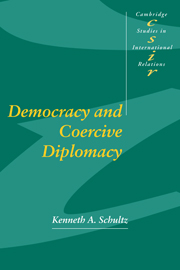Book contents
- Frontmatter
- Contents
- List of figures
- List of tables
- Preface
- 1 Introduction
- Part I Theory
- Part II Empirical analysis
- 5 Selective threats, effective threats: the initiation and escalation of international crises
- 6 Credibility confirmed: the implications of domestic support
- 7 Credibility undermined: the implications of domestic dissent
- 8 Conclusions and implications
- Appendices
- References
- Index
- CAMBRIDGE STUDIES IN INTERNATIONAL RELATIONS
5 - Selective threats, effective threats: the initiation and escalation of international crises
Published online by Cambridge University Press: 08 October 2009
- Frontmatter
- Contents
- List of figures
- List of tables
- Preface
- 1 Introduction
- Part I Theory
- Part II Empirical analysis
- 5 Selective threats, effective threats: the initiation and escalation of international crises
- 6 Credibility confirmed: the implications of domestic support
- 7 Credibility undermined: the implications of domestic dissent
- 8 Conclusions and implications
- Appendices
- References
- Index
- CAMBRIDGE STUDIES IN INTERNATIONAL RELATIONS
Summary
The empirical analysis in this chapter centers around two effects which the informational perspective emphasizes: what I have referred to as the restraining and confirmatory effects. The restraining effect stems from the fact that governments that lack the ability to monopolize private information are less able to exploit information asymmetries through deception and bluff. Transparency and public competition mean that democratic governments face substantial constraints on their ability to make threats which they cannot or do not intend to carry out. The result, as we will see, is that governments so constrained are less likely to make militarized challenges against other states than are governments that have more leeway to engage in deceptive behavior.
The confirmatory effect goes hand in hand with this restraining effect. In the narrow sense in which we used this term in Chapter 4, the confirmatory effect stems from the existence of a second information source – the opposition party – whose interests conflict with those of the government. This second signaler can credibly confirm the genuineness of the government's threat and thereby increase the likelihood that the rival state will back down. At a more general level, the confirmatory effect stems from the fact that, if a government is constrained from bluffing, then the threats which it does choose to make are more likely to be genuine than are the threats made by a government not similarly constrained. As a result, the target of a challenge from a democratic state should be less likely to resist than should the target of a threat made by a nondemocratic state.
- Type
- Chapter
- Information
- Democracy and Coercive Diplomacy , pp. 119 - 160Publisher: Cambridge University PressPrint publication year: 2001



